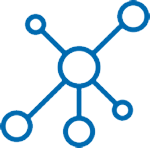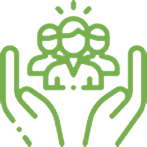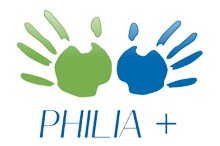The Philia project
Philia’s goal is to create new training courses, with the collaboration of youngster involved in social services, social workers, researchers, teachers and their students.
We aim to improve the training of social workers for a better efficiency in their practice.
We worked on two strategic themes: networks and success.
An innovative research based on different approaches
Respecting each person's Power to act: Power to act is the ability to have more control over what is important to you, your entourage, or the community you identify with. It is a power of control that we exercise or develop individually or collectively. The Power to act approach we relied on is the one defined by the Canadian, Yann Le Bossé.
Respecting an ethical framework: In our training contents, ethic raises questions that are essential for quality support. It is also a question of how the support takes into account the context of the youngster, which is why we have set up specific contents for Roma communities and unaccompanied foreign minors.
The Merging of Knowledge: It is a dynamic that allows knowledge from people's life experience to interact with scientific and professional knowledge. These two different types of knowledge produce more comprehensive and inclusive knowledge and methods of action. The approach is based on a rigorous methodology that has been tried and tested for years by the French NGO ATD Quart Monde (ATD Fourth World).
A Collaborative Action-Research
Eleven partners from 5 countries, including 4 Universities, 2 Schools of Social work and 5 social service organizations and NGO's, worked together in an innovative collaborative action-research. All those actors were co-researchers.
This research enabled a transfer of academic knowledge to field actors (youngsters, workers…), and a transfer of life living knowledge to researchers. These exchanges and cooperation are the heart of the project. The collaboration took place on a European scale, with the involvement of five countries: France, Belgium, Portugal, Romania and Germany.
The articulation between the theories and practices of social work, nourished by the testimonies of the young people and professionals who live these issues on a daily basis, is the added value of the Philia project.
In a first step, the researchers analyzed national care systems, social work trainings and the social context of the five European countries. In 2018, 16 focus groups were conducted, bringing together youngster involved on one hand, and social workers and social work students on the other. These focus groups were coordinated by researchers and trainers. They allowed the creation of research material that was then analyzed to identify key ideas and concepts.
What we learned about networks
In the Philia project, the young people and social professionals exposed their vision of the youngster’s Network. .
- It was striking that the social workers’ conception of the youngster’s network is much narrower than youngster’s own conception. Professionals focus on the school and natural network and exclude themselves, while youngsters include them.
- Young people compared to professionals added friendship networks, leisure networks (sports, cultural...) and even illicit networks (dealers for example who can quickly provide money or a roof for a night). They also placed the judge and the social worker in their network.
- The young people called for a nuanced judgment on the resources of their network: a defaulting parent is both an obstacle and a resource, same thing for the judge, the social worker or the friend also drug dealer.
- The youngsters symbolized their network with a star figure in which they are at the center. Since each branch is not linked to the other, they regret having to repeat their story and having it received differently from one worker to another.
- In terms of the social worker-youth relationship, the research confirmed the value of the Yann Lebosse’s Power to act approach. It is important to consider that young people have their own reality and that they are capable of making their own decisions. The social worker must develop a professional stance to promote this: an exchange in reciprocity, non-judgmental, listening and consideration.
What we learned about success
The Philia project focused on educational and professional success as a support for emancipation. The young people participating in the Collaborative Action Research wanted to expand the concept. For them, success has several dimensions: success can be familial, conjugal, professional and academic.
The young people who participated in the focus groups do not dream of becoming social network celebrities, singers, professional footballers or millionaires. Most of them want to have a degree and start their professional and family life, a realistic and shared ambition. For them, the key to success lies in an immediate support based on trust towards and from the social worker.
For social workers, success in social support means achieving micro-objectives, a step-by-step progress towards the independence of the youngster. To do this, it is essential to position the young person as an actor.
Results experimented with young people, professionals, students, teachers, researchers...
The innovative tools and processes that emerged from the research were tested in practical application by the project stakeholders. Theater of the Oppressed, Family conferences, Merging of knowledge... These are some of the methods and tools you will find in the Educational kit.
The Educational kit and all the contents designed within the Philia+ project are free of rights. Whether you are a trainer, a student or a social worker, we recommend that you consult our User guide. In just a few minutes, you will know everything about the kit and the requirements to make it your own: the first being to follow a course on the Yann Leboss’s Power to act approach.
 Our approaches
Our approaches  Success
Success  Networks
Networks  Groups of special needs
Groups of special needs













